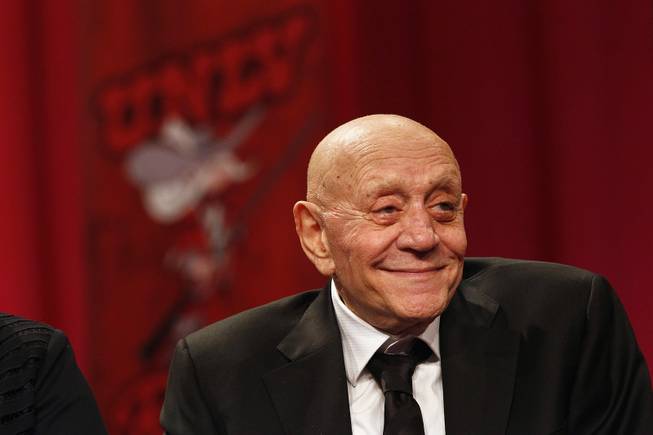
Las Vegas Sun
Former UNLV coach Jerry Tarkanian smiles while being inducted into the Naismith Memorial Basketball Hall of Fame on Sunday, Sept. 8, 2013, at Symphony Hall in Springfield, Mass.
Published Wednesday, Feb. 11, 2015 | 9:05 a.m.
Updated Wednesday, Feb. 11, 2015 | 9:30 p.m.
Related Stories
Jerry Tarkanian, the towel-biting, head-shaved, raspy-voiced coach who built the UNLV basketball program into a powerhouse and led the Rebels to the 1990 national championship, died today. He was 84.
During his 19-year tenure at UNLV that ended with a pressured resignation, Tarkanian coached the Rebels to four appearances in the Final Four, winning his place as one of Las Vegas’ legendary figures. In a city with no professional sports team, Tarkanian’s team was the toast of the town, proving so successful with its brand of fast-break basketball the Thomas & Mack Center was built to accommodate the growing legion of fans wanting to watch Tark’s Runnin’ Rebels.
He was one of the winningest coaches in college basketball history — amassing a 784-202 (.794) career record, including a 509-105 run at UNLV where he’ll always be considered the program’s founder father.
Tarkanian's son Danny announced his father's death via Twitter. "Coach Tark, my father, the greatest man I have ever known, passed today, to take his place in heaven. I will miss him every day of my life," he said.
In a statement issued on behalf of the family, Jerry Tarkanian's wife, Lois, said, “Jerry has been in fragile health since 2009. He fought his health problems with the same courage and tenacity he showed throughout his life. Our family thanks, from the bottom of our hearts, all those who have sent letters and prayers, who have shown their love for Jerry and support for our family, the numerous fans, and the many players who considered him a second father.
“Our hearts are broken but filled with incredible memories. You will be missed Tark,” she said.
According to media reports, the Tarkanian family is inviting the public to attend a celebration to honor the legendary coach on March 1 at the Thomas & Mack Center.
Even in his ailing health the past few seasons and being limited to a wheelchair, Tark would attend most home games, quickly receiving a standing ovation from fans.
He also posted a 122-20 mark at Long Beach State (1968-73) and 153-80 at Fresno State (1995-2002) before retiring. And he coached at two junior colleges and briefly with the San Antonio Spurs of the NBA, only twice not recording a 20-win season in his Hall of Fame career.
But, make no doubt about it, Las Vegas was where Tarkanian made his mark.
The Rebels’ 103-73 win against Duke in the 1990 for the championship still stands as the largest margin of victory in a title game — and the brightest moment in Las Vegas sports history. UNLV arguably had a better team the following year, when stars Larry Johnson, Stacey Augmon and Greg Anthony elected to return for their senior seasons out of loyalty to Tarkanian, going undefeated until losing by two points to Duke in the national semifinals.
The three players were lottery draft picks in the 1991 NBA Draft, and in the pros they wore jersey No. 2 — Tarkanian’s college number when he played at Fresno State — to honor their former coach.
Tarkanian was both father figure and mentor to the players, preferring to recruit inner-city athletes who were a little rough around the edges and transforming them into winners on and off the court, even if most didn’t shine academically.
“It was a crazy idea for other coaches, but Tark gave the inner city kids a chance,” said Eldridge Hudson, who played in the program from 1982 to 1987. “Tark wasn’t scared to take the inner city kid, and because of that, he had a roster of hard-nosed kids who weren’t afraid to pop you. He believed in us and we believed in him.”
But Tarkanian had more than his share of troubles at UNLV, especially late in his career when investigations from the NCAA and from within his own university forced him to resign after three of his players were photographed in a hot tub with a notorious gambler.
He and UNLV would later reconcile; today at Thomas & Mack, the basketball court is named the Jerry Tarkanian Court. And in 2013, a statue of Tarkanian was constructed outside the arena as part of Jerry Tarkanian Legacy Project. He eventually got his due nationally, too. After years of being snubbed for the Naismith Basketball Hall of Fame, an exclusion most credited to his rifts with the NCAA, Tarkanian was inducted into the hall in 2013.
• • •
Born Aug. 8, 1930, in Euclid, Ohio, Tarkanian was the son of Armenian immigrants. Some of his ancestors were killed during the genocide by Turkish soldiers in the early 20th century.
He was urged by his stepfather to become a barber, a noble profession but not what he was passionate about. It didn’t take long for Lois, his wife of more than 60 years, to realize Tarkanian was best-suited for coaching.
“We didn’t have a big wedding because we didn’t have a lot of money,” he said in 2011. “I was the assistant football coach at a Catholic high school and it was football season. We had a game on Friday night and we got married on Saturday. I took her to the Fresno State/Idaho football game [for our honeymoon], and she’s never forgiven me for that.”
Tarkanian, who attended Pasadena City College before transferring to Fresno State, where he played basketball in 1954 and 1955, started his coaching career at a high school in California in 1956. His first college job was at Riverside City College in 1961. He took the head coaching job at Pasadena City College in 1966 and led the school to three state junior college championships.
In 1968, Tarkanian became a Division I basketball coach at Long Beach State, taking it to the NCAA tournament four times and amassing a 122-20 record, including a 40-2 mark in the Big West Conference, where he won four straight conference titles.
At Long Beach, Tarkanian pioneered the recruitment of junior college stars into the major college ranks, a practice he perfected at UNLV — Larry Johnson, arguably the best player in Rebel history and the star of the national championship team, came from the junior college ranks.
When he was inducted into the hall of fame, Tarkanian’s children and grandchildren wore vintage T-shirts from all of his coaching stops. Most players share a similar story: Tarkanian gave them a chance when others passed. They remained loyal to Tarkanian over the years, constantly calling for updates on his health and making sure to coordinate visits. And it wasn’t just the superstars.
“If you are a ballplayer, you might get one or two good coaches in your career,” Larry Bonzoumet, who played for Tarkanian in 1966 at Riverside City College, said in 2013. “Tark recruited me out of high school and convinced me to play for him. He said, ‘If you come to community college and play for me one year, you will have 10 or 12 (Division I) schools to choose from,’ and I did. I owed it all to him.”
• • •
For the first 10 seasons at UNLV, Tarkanian’s teams played their home games in the old Las Vegas Convention Center, which had just 6,380 seats and was affectionately called Tark’s Shark Tank. Apropos of Las Vegas, each game featured high energy music and rolling spotlights prior to the introduction of the starting line-ups.
Tarkanian’s teams were practically unbeatable in that cozy arena, amassing a 157-19 record (.892). His squads used a run-and-gun offense combined with a suffocating defense, often scoring 100-plus-points in blowout victories.
UNLV, led by future NBA star Reggie Theus, made it to the Final Four in 1977, losing to North Carolina in the semifinals by one point. The Rebels set NCAA records for most points in a season (3,426) and most 100-point games (23) that year — a time before the NCAA established a shot clock and games were often low-scoring because teams would hold the ball late in games.
In those days, students struggled to get tickets for home games because the small building was consistently sold out to boosters and other wealthy supporters. The program’s success made it necessary to build the 18,650-seat Thomas & Mack, which is named for two bankers and big UNLV boosters. But, in effect, it is the house that Tark built, opening in 1983.
Tarkanian honored
KSNV reports that Jerry Tarkanian was honored at a Bishop Gorman high school game.
A few years after the arena opened, the era Rebel fans affectionately call the “Glory Years” began. Tarkanian coached UNLV to three Final Four appearances in five years starting in 1987, when the Rebels lost to Indiana in the national semifinals.
But the ‘87 Rebel team, led by Armen Gilliam and Freddie Banks, set a school record for wins in a season, compiling a 37-2 record and laying the ground work for future success.
Three years later, Tarkanian won his first and only national championship, culminating with the big win over Duke, with a team led by Johnson, Anthony, Augmon and Anderson Hunt.
• • •
Throughout much of his career, Tarkanian was shadowed by scandal, and it ultimately took its toll in 1992 when, under pressure, he resigned from UNLV.
He was hired as head coach of the San Antonio Spurs, worked just 20 games before being fired by Spurs owner Red McCombs in a disagreement over the need for an experienced point guard, and finished his coaching career in 2002 at Fresno State — where the contract specifically called for him to abide by NCAA rules.
Indeed, success for Tarkanian did not come without heartache.
After Tarkanian left Long Beach State in 1973, the NCAA vacated six of Long Beach State NCAA tournament victories under Tarkanian, amid accusations of recruiting violations. The school also was placed on probation with little or no due process, a factor that sparked Tarkanian’s crusade against the organization to bring about change.
Just before the 1976-77 season, UNLV was placed on two years’ probation for alleged violations dating back to two years before Tarkanian arrived at UNLV. The NCAA pressured UNLV to suspend Tarkanian for two years as well.
Tarkanian sued and in September 1977 a Clark County district judge issued a permanent injunction that reinstated Tarkanian to his job.
The case eventually went to the U.S. Supreme Court, which ruled in 1988 to, in effect, uphold the injunction. The high court found that while the NCAA could discipline its members it had to follow due process.
It had long been alleged that the NCAA was heavy-handed in its rulings and offered little or no due process, often using hearsay evidence to find schools in violation of NCAA rules and imposing penalties. Tarkanian alleged in his Las Vegas Sun column that the NCAA was more apt to punish smaller schools than the big-name college programs.
The beginning of the end for Tarkanian began after a photo of three Rebel players in a hot tub with notorious gambler Richard “Richie The Fixer” Perry, taken in 1989, was published a few weeks after the 1991 season.
Amid heavy pressure from school officials including the university’s then-president, Robert Maxson, Tarkanian resigned after the 1992 season. The decision triggered applause from some corners of the community who were disappointed by the players’ low graduation rates under Tarkanian, and rousing protests from other fans who were especially vocal at home games.
In 1998, Tarkanian settled his legal battles, accepting $2.5 million from the NCAA, the largest settlement in the organization’s history. The NCAA admitted no wrongdoing for the aggressive actions it took against Tarkanian, which included having him suspended from coaching, vacating 55 of his victories (the six at Long Beach State and 49 more at Fresno State) and placing the teams he coached at Long Beach State, UNLV and his alma mater Fresno State on probation. Many observers, however, viewed the payoff as vindication for Tarkanian.
In testimony before a House subcommittee in 2002, then-Rep. Shelley Berkley, D-Nev., blasted the NCAA over its handling of Tarkanian, who she said had “dared to challenge the awesome power of the NCAA.”
Berkley, a university regent when Tarkanian resigned, said she saw firsthand how the NCAA “stopped at nothing” to destroy Tarkanian’s coaching career at UNLV.
“Coach Tark won his lawsuit against the NCAA,’’ she said, "but only after years of litigation ... in which the NCAA spent millions of dollars in legal fees."
In an interview that year, Tarkanian expressed regrets for having taken on such a formative organization that made his life a living hell and arguably took a few years off it.
“Even though I won $2.5 million, it wasn’t worth it,” Tarkanian said. “The NCAA is so unfair and so vindictive. They never let up. If I had to do it all over again, I wouldn’t fight them. It was a nightmare.”
• • •
After Tarkanian’s departure, UNLV experienced its worst stretch in program history, only making in the NCAA Tournament twice since the 1991 loss to Duke until the program’s rebirth under Lon Kruger in the mid-2000s.
Kruger welcomed back Tarkanian and the legends from his teams, leading an effort to name the court at the Thomas & Mack “Jerry Tarkanian Court” in 2005. Kruger also hosted alumni games and honored the 1990 championship team on the 20th anniversary of their title.
It’s a celebration that wouldn’t have been attended by most players had the university not mended fences with Tarkanian. Some former players, most notably Augmon and Johnson, were so displeased at the way UNLV officials handled the Tarkanian situation, they had disassociated with the school.
HBO in 2011 produced a documentary “Runnin’ Rebels of UNLV,” which profiled the program’s rise and fall, and its troubles with the NCAA. The producers received Tarkanian’s support in making the film.
“I get upset every time I think about the NCAA. I just get so mad whenever I read or see something about the NCAA and how they treated me so unfairly,” Tarkanian said after watching the film. “I have to learn to better accept everything that happened with the NCAA. That is part of me.”
Tarkanian, who returned to Las Vegas after finishing his coaching career in 2002 at Fresno State, wrote columns for the Sun in his retirement and became a fixture at UNLV practices — especially in 2011 after Dave Rice, a reserve on the back-to-back Final Four teams, took over the program.
Slowed physically and often needing assistance to walk, Tarkanian was still sharp mentally and took pride in spending time talking strategy with Rice in his office. At practices, Rice made sure Tarkanian had a spot on the bench. The players, without being prompted, would always greet Tarkanian during breaks.
“I’m humbled because coach Tarkanian is right here and that I have the job that he had, and that makes the difference to all of us who were Runnin’ Rebels,” Rice said during his introductory news conference in April 2011 on the day he was hired.
His “Shark Bytes Blog” on LasVegasSun.com frequently included well-wishes from fans in the comments portion of the article, especially after Tarkanian suffered a series of nasty spills in 2009 at his vacation house in San Diego. He broke two ribs when he slipped out of the hot tub, fractured his right shoulder a few days later and fell on his face while walking on a Pacific Beach sidewalk.
Tarkanian often used his column to talk about the program’s legendary games and always spoke fondly about his former players. When Gilliam suddenly died in 2011, Tarkanian — despite his declining health — traveled to Pittsburgh for the funeral.
Like all of his former players, Tarkanian always had their backs in good times and bad.
“You couldn’t ask for a better group of people in terms of loyalty and working hard,” he wrote about the back-to-back Final Four teams in one of his columns. “They were a tough group of kids who gave me everything they had. It always bothered me how some people in the administration at the school thought negatively about those kids.
“That was far from the truth. They were a great group and so loyal to me,” he continued. “Just some great human beings. We played so hard. No one in the country played as hard as we did. Other coaches would always talk about how hard my guys played.”
“The bottom line is that man gave us an opportunity others wouldn’t,” Jarvis Basnight, a starter on the 1987 Final Four team, remarked. “I will go to my grave honoring and respecting him. He made it possible for everyone to go to UNLV. He looked at you as a human being and not just a basketball player. He wanted to make sure we had a better life.”
“I was very fortunate to make a living doing something I loved,” he wrote in December 2009. “I wouldn’t have traded it, especially my years at UNLV, for anything in the world. I just loved coaching at UNLV and the players we had.”
In addition to Lois, Tarkanian is survived by four children — Pam, Jodie, George and Danny — and 11 grandchildren.
Ed Koch, a former longtime Las Vegas Sun reporter, contributed to this report.
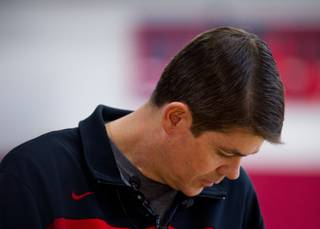
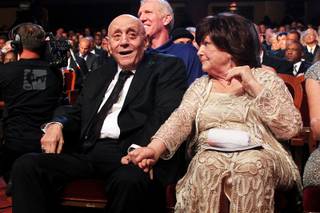
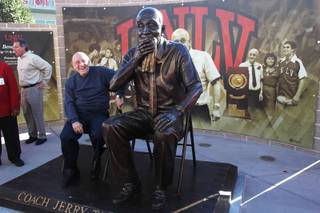
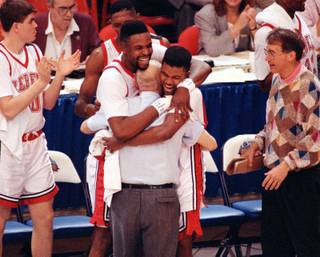

Join the Discussion:
Check this out for a full explanation of our conversion to the LiveFyre commenting system and instructions on how to sign up for an account.
Full comments policy